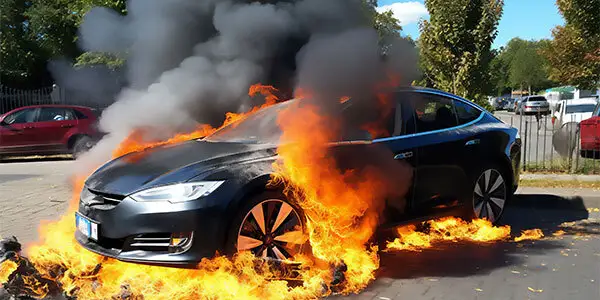In a move poised to redefine the narrative surrounding the Chevy Bolt EV battery fires, General Motors (GM) is set to embark on a comprehensive replacement program for affected battery modules. Within weeks, some owners of Chevy Bolt EVs will be able to book appointments to have their battery modules replaced entirely. This development follows an extended period of recalls, software patches, and public scrutiny, which has left both GM and its battery supplier, LG Energy Solution, grappling with reputational and financial fallout.
Understanding the Context: A Year of Fires and Frustration
For those unfamiliar with the saga, GM’s decision stems from a series of battery-related fires that plagued the Chevy Bolt EV. Over a span of just over a year, more than a dozen incidents were reported, with a troubling cluster of four fires in July alone. GM initially responded in November of the previous year by issuing a recall notice instructing owners to cap their vehicle’s charge at 90%. This directive was soon followed by a software update enforcing the restriction.
Months of relative calm were disrupted in late April when GM introduced what was labeled as a “final” software solution. However, the optimism was short-lived; the software failed to prevent subsequent fires, leading GM to issue a second recall in early July. This time, owners were advised against parking indoors or charging their vehicles unattended. The urgency intensified as two more fires were reported on July 25th, further exacerbating concerns about the safety of the affected vehicles.
The Fallout: A Challenging Year for GM and LG
The Chevy Bolt’s battery issues have been a public relations quagmire for both GM and LG. As GM works toward its ambitious vision of an all-electric future, loyal Bolt owners—many of whom viewed themselves as pioneers of this journey—have voiced frustrations over insufficient communication and support.
Financial Repercussions
The financial implications have been severe:
| Entity | Impact |
|---|---|
| GM | Announced an $800 million write-down in Q2 for warranty replacements, causing shares to drop 8%. |
| LG Energy Solution | Incurred a $200 million write-down, reducing profit forecasts by 21%. |
It is worth noting that these figures were announced prior to the second recall, suggesting the financial toll could climb higher in subsequent quarters. Despite the strain, GM and LG remain partners in the Ultium battery platform, signaling a complex and interdependent relationship.
Broader Implications for LG
LG’s struggles are not confined to the Chevy Bolt. Earlier this year, Hyundai recalled 82,000 EVs—including Kona EVs and Ioniqs—due to similar battery fire risks linked to manufacturing defects. LG was found at fault for poorly folded battery tabs, though the company disputed the claim and shifted blame to Hyundai’s charging protocols. LG ultimately bore 70% of the financial burden, underscoring the widespread impact of its quality control issues.
New Defects Identified: A Systemic Problem?
GM has disclosed that not one but two rare manufacturing defects were identified in LG’s production process for the Bolt’s battery cells. While GM has refrained from explicitly labeling the issue as systemic, the recurrence of such defects raises serious questions about LG’s quality control standards. This revelation has further fueled a class-action lawsuit against LG, alleging systemic failures in its battery production.
A Silver Lining: GM’s Path to Redemption
Amid the turmoil, GM’s announcement of a battery module replacement program offers a glimmer of hope for affected Bolt owners. Starting August 23rd, owners of higher-risk vehicles can begin scheduling appointments to have all modules within their batteries replaced. This initiative also includes a new 8-year/100,000-mile warranty, a significant reassurance for drivers concerned about the long-term reliability of their vehicles.
Prioritization Criteria
GM’s replacement program will prioritize:
- Vehicles Produced During High-Risk Manufacturing Periods: Bolts manufactured during periods identified as having a higher likelihood of defects will be addressed first.
- Drivers with Deep Discharge Habits: Owners whose OnStar telemetry data indicates frequent deep discharges will also receive priority.
This phased approach aligns with GM’s internal investigations and independent analyses, which have pinpointed 2019 model-year Bolts manufactured in October and November 2018 as disproportionately prone to fires. Moreover, data suggests a correlation between low-charge conditions and fire risks, further supporting GM’s prioritization strategy.
Insights from GM’s Spokesperson
When asked about the shift in strategy, a GM spokesperson emphasized that this initiative reflects “an abundance of caution” aimed at ensuring the safety of all affected vehicles. Replaced modules will undergo forensic analysis, enabling GM and LG to refine their understanding of the defects and potentially develop an in-situ detection method for future use.
However, a significant caveat accompanies this announcement: should GM identify a reliable detection mechanism, future replacements may target only defective modules rather than entire batteries. This approach balances cost-effectiveness with the ongoing commitment to safety.
Electrek’s Perspective: A Mixed Bag of Progress
Electrek views GM’s latest initiative as a belated but necessary step. While the decision to replace all modules in high-risk vehicles is commendable, it underscores the limitations in GM’s existing detection capabilities. By committing to replacements now, GM is effectively “buying time” to refine its diagnostic tools while addressing immediate safety concerns.
Enhanced Warranty and Range
For owners, the new battery modules not only promise improved safety but also unlock the increased range of 2020+ model-year Bolts. This upgrade is particularly valuable for drivers who have surpassed the original 100,000-mile warranty, offering them extended usability and peace of mind.
Lingering Challenges
Despite these advancements, GM faces unresolved challenges. Owners impacted by fires or prolonged uncertainty have endured financial losses, emotional distress, and diminished vehicle value. Meaningful restitution—whether through trade-ins, compensation, or other measures—remains a crucial aspect of restoring customer trust.
Final Thoughts: The Road Ahead
GM’s decision to replace Chevy Bolt battery modules represents a turning point in its management of this crisis. However, it is also a reminder of the intricacies and vulnerabilities within the EV supply chain. As automakers continue to transition toward electrification, the importance of robust quality control and transparent communication cannot be overstated.
For Bolt owners, the replacement program offers a long-awaited resolution. Yet the broader EV industry must learn from these events to prevent similar challenges in the future. As the adage goes, “an ounce of prevention is worth a pound of cure”—a lesson that GM, LG, and the entire EV ecosystem would do well to heed.
Suggestions for Restitution
To further rebuild trust, GM might consider the following actions:
- Offering enhanced trade-in values for affected vehicles.
- Providing goodwill incentives, such as extended warranties or discounts on future EV purchases.
- Establishing a dedicated support hotline for Bolt owners with unresolved concerns.
What are your thoughts? Share your ideas below on how GM can better address this crisis.



